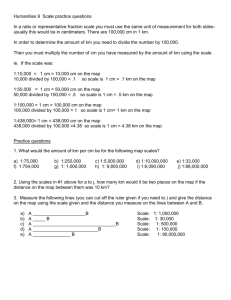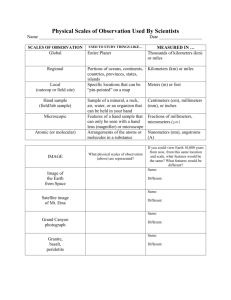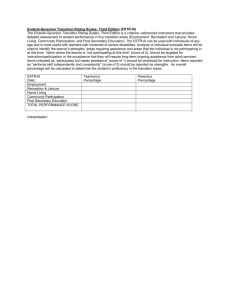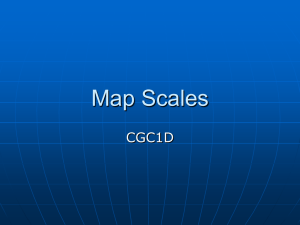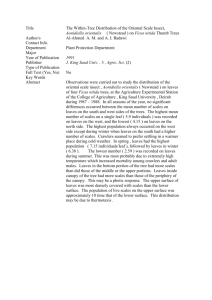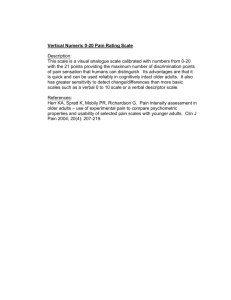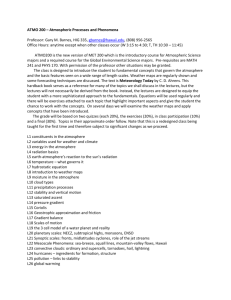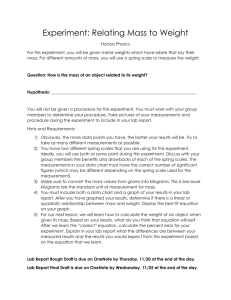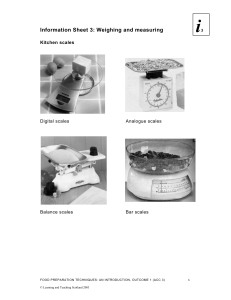1983 master list of items for recreation experience preference scales
advertisement
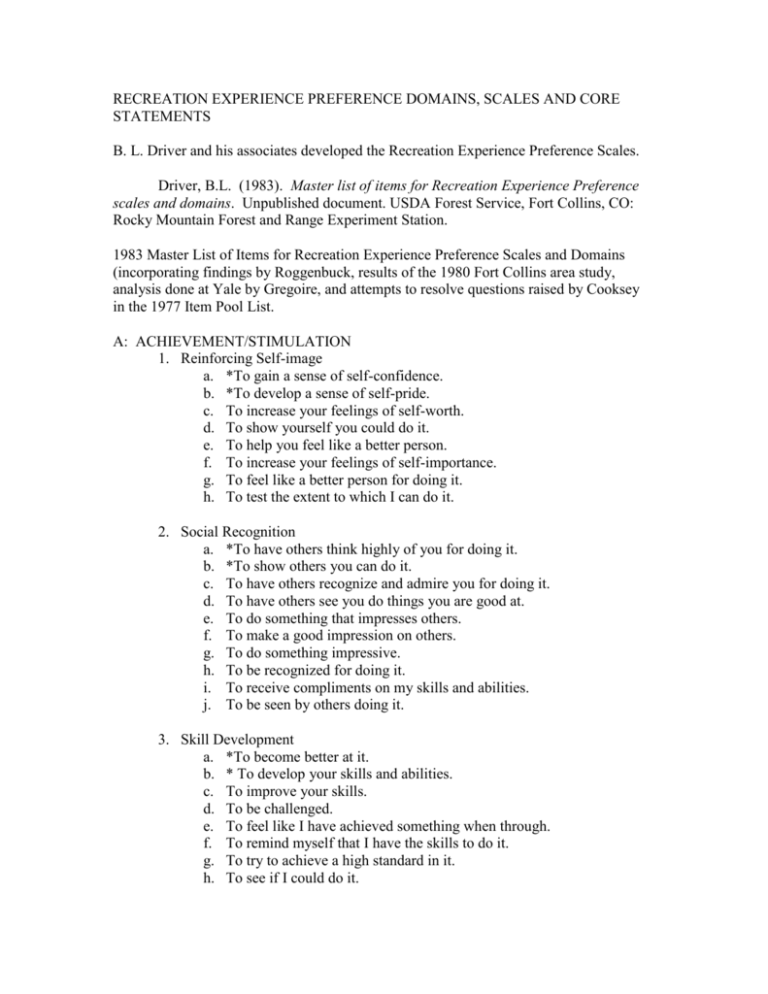
RECREATION EXPERIENCE PREFERENCE DOMAINS, SCALES AND CORE STATEMENTS B. L. Driver and his associates developed the Recreation Experience Preference Scales. Driver, B.L. (1983). Master list of items for Recreation Experience Preference scales and domains. Unpublished document. USDA Forest Service, Fort Collins, CO: Rocky Mountain Forest and Range Experiment Station. 1983 Master List of Items for Recreation Experience Preference Scales and Domains (incorporating findings by Roggenbuck, results of the 1980 Fort Collins area study, analysis done at Yale by Gregoire, and attempts to resolve questions raised by Cooksey in the 1977 Item Pool List. A: ACHIEVEMENT/STIMULATION 1. Reinforcing Self-image a. *To gain a sense of self-confidence. b. *To develop a sense of self-pride. c. To increase your feelings of self-worth. d. To show yourself you could do it. e. To help you feel like a better person. f. To increase your feelings of self-importance. g. To feel like a better person for doing it. h. To test the extent to which I can do it. 2. Social Recognition a. *To have others think highly of you for doing it. b. *To show others you can do it. c. To have others recognize and admire you for doing it. d. To have others see you do things you are good at. e. To do something that impresses others. f. To make a good impression on others. g. To do something impressive. h. To be recognized for doing it. i. To receive compliments on my skills and abilities. j. To be seen by others doing it. 3. Skill Development a. *To become better at it. b. * To develop your skills and abilities. c. To improve your skills. d. To be challenged. e. To feel like I have achieved something when through. f. To remind myself that I have the skills to do it. g. To try to achieve a high standard in it. h. To see if I could do it. 4. Competence Testing a. *To test your abilities. b. *To learn what you are capable of. 5. Excitement a. *To have thrills. b. *To experience excitement. c. To experience a lot oaf action. d. To have a stimulating and exciting experience. e. To experience the fast paced nature of things. f. To feel exhilaration. g. To get all charged up. h. To experience the exciting events that always happen here. i. To cause things to happen. 6. Endurance a. ***To test your endurance. b. ***To rely on your wits and skills. c. ***To gain a sense of accomplishment. 7. Telling Others a. ***To tell others about the trip. b. ***To have others know that you have been there. B: AUTONOMY/LEADERSHIP 1. Independence a. *To feel my independence. b. *To be on my own. 2. Autonomy a. *To be my own boss. b. *To be free to make your own choices. c. **To be obligated to no one. d. **To do things your own way. e. To think for myself. f. To be at a place where I can make my own decisions. 3. Control-Power a. *To control things. b. *To be in control of things that happen. c. To have a chance to have control over things. d. To be more in control here. e. To be in charge of what’s happening. f. To have a chance to feel in charge of what’s happening. g. To be in command of a situation. h. To put yourself in a position of power or authority. i. To manipulate things. C: RISK TAKING 1. Risk Taking a. *To take risks. b. *To chance dangerous situations. c. To experience the uncertainty of not knowing what will happen. d. To experience the risks involved. D: EQUIPMENT 1. Equipment a. *To use your equipment. b. *To talk to others about [your/our] equipment. c. To test and use your equipment. d. To compare my equipment with others. E: FAMILY TOGETHERNESS 1. Family Togetherness a. *To do something with your family. b. *To bring your family closer together. c. To do something the family could do together. d. To get the family together more. e. To realize a good experience for the family. f. To do what my children wanted me to. g. To do something the entire family would like. h. To get the family together for awhile. i. To do something so the family could spend more time together. j. To do something my spouse or associate wanted me to. F: SIMILAR PEOPLE 1. Being with Friends a. *To be with members of [your/our] group. b. *To be with friends. c. To do things with your companions. d. To enjoy the company of people who came with me. 2. Being with similar people a. *To be with [others/people] who enjoy the same things you do. b. *To be with people having similar values. c. To be with people who have similar interests. d. To be with people who are enjoying themselves. G: NEW PEOPLE 1. Meeting New People a. *To talk to new and varied people. b. c. d. e. f. *To meet other people in the area. To meet new people. To meet other people. To build friendships with new people. To see new faces. 2. Observing Other People a. *To be with and observe other people using the area. b. *To observe other people in the area. c. To observe the other people. H: LEARNING 1. General Learning a. *To develop [your/my] knowledge of things [here/there]. b. *To learn more about things [here/there]. c. To find out about things here. d. To understand things here better. 2. Exploration a. *To experience new and different things. b. *To discover something new. c. To find out about things. d. To explore the area. e. To explore things. f. To see new and different things. g. To experience the unknown. h. To experience a sense of discovery involved. 3. Geography of Area a. *To get to know the lay of the land. b. *To learn about the topography of the land. 4. Learn About Nature a. *To study nature. b. *To learn more about nature. c. To learn more about natural settings. d. **To gain a better appreciation of nature. I: ENJOY NATURE 1. Scenery a. *To view the scenery. b. *To view the scenic beauty. c. To enjoy the scenery. d. To observe the scenic beauty. e. To take in the scenic beauty. f. To look at the pretty view. g. To observe the scenic beauty. 2. General Nature Experience a. *To be close to nature. b. *To enjoy the smells and sounds of nature. c. To take in the natural surroundings. d. To be in a natural setting. e. To be where things are natural. f. To obtain a feeling of harmony with nature. J: INTROSPECTION 1. Spiritual a. *To develop personal, spiritual values. b. *To grow and develop spiritually. c. To reflect on personal religious values. d. To reflect on your religious or other spiritual values. e. To be in closer touch with higher spiritual values. f. To get a greater sense of spiritual being. 2. Introspection a. *To think about your personal values. b. *To think about who you are. c. To help you understand better what your life is all about. d. To learn about yourself. e. To learn more about yourself. f. To rebuild the world in my mind. g. To think about how I would like the world to be. h. To think new thoughts. i. To paint things in my mind like an artist. K: CREATIVITY 1. Creativity a. *To be creative. b. *To do something creative such as sketch, paint, take photographs. c. To put some thoughts or ideas together. d. To create something new or different. e. To gain a new perspective on life. L: NOSTALGIA 1. Nostalgia a. *To think about good times you’ve had in the past. b. *To bring back pleasant memories. c. To reflect on past memories. d. To recall past satisfactions. e. To gain an experience I can look back on. M: PHYSICAL FITNESS 1. Exercise-Physical Fitness a. *To get exercise. b. *To keep physically fit. c. To improve [my/your] physical health. d. To help keep you in shape physically. e. To feel good after being physically active. f. To tone up my muscles. N: PHYSICAL REST 1. Physical Rest a. *To relax physically. b. *To rest physically. c. To take it easy physically. d. To give my body a rest. O: ESCAPE PERSONAL-SOCIAL PRESSURES 1. Tension Release a. *To help get rid of some clutched-up feelings. b. *To help release or reduce some built up tensions. c. To help reduce some frustrations [I/you] have been feeling. d. To release or reduce tension. e. To help get rid of some anxieties. f. To help get rid of some up-tight feeling. 2. Slow Down Mentally a. *To have your mind move at a slower pace. b. *To give your mind a rest. c. To recover from [my/your] usual hectic pace. d. To have your mind slow down for a while. e. To have a break from being too busy mentally. 3. Escape Role Overloads a. *To get away from the usual demands of life. b. *To avoid everyday responsibilities for awhile. c. To reduce the feeling of having too many things to do. d. To get away from some of the expectations people have of me back home. e. To rest awhile from the feeling of being overloaded at home or work. f. To get away from the demands of other people. g. To feel less tied down for awhile. 4. Escape Daily Routine a. *To have a change from your daily routine. b. *To have a change from everyday life. c. To do something different from what [I/you] do back home. d. To have a change of pace from everyday life. e. To add some variety to my daily routine. f. To have a change from your everyday self. P: ESCAPE PHYSICAL PRESSURE 1. Tranquility a. *To experience tranquility. b. *To experience solitude. c. To experience the peace and calm. d. To experience surroundings that are soothing. e. To experience the calming and healing setting. f. To sense a feeling of balance in things around me. g. To enjoy the quietness and beauty. h. To be where it is quiet. 2. Privacy a. *To feel isolated. b. *To be alone. c. To get away from other people. d. To have more privacy than you have back home. 3. Escape Crowds a. *To be away from crowds of people. b. *To experience more elbow room. c. To get away from crowded situations for awhile. d. To experience the open space. e. To [seek/enjoy] distant or unobstructed views. f. To get away from civilization for awhile. g. I thought there would be less confusion here. 4. Escape Physical Stressors a. *To get away from the clatter and racket back home. b. *To get away from noise back home. c. To get away from the ugly scenes back home. d. To get away from the bright lights back home for awhile. e. To escape the pollution back home for awhile. f. To get away from other people. Q: SOCIAL SECURITY 1. Social Security a. *To be near considerate people. b. *To be with respectful people. c. To be with considerate people. d. To be with fairly honest people e. To be where things are fairly safe. f. To be with people who are nice to each other. R: ESCAPE FAMILY 1. Escaping Family a. *To be away from the family for awhile. b. *To escape the family temporarily. c. To be without the family for awhile. S: TEACHING-LEADING OTHERS 1. Teaching-Sharing Skills (Sharing Knowledge/Directing Others) a. *To teach your outdoor skills to others. b. *To share what you have learned with others. c. To share your skill and knowledge with others. d. To help others learn about things here. e. To teach others about things here. 2. Leading Others (Sharing Knowledge/Directing Others) a. *To help direct the activities of others. b. *To lead other people. c. To show others what to do. T: RISK REDUCTION 1. Risk Moderation a. *To be near others who could help if you need them. b. *To know others are nearby. 2. Risk Avoidance a. *To be sure of what will happen to you. b. *To avoid the unexpected. U: TEMPERATURE 3. Temperature a. *To get away from the heat. b. *To experience a nicer temperature. c. To have more agreeable temperatures. d. To be where it is cooler. *Denote core items for that scale. **New item from the 1980 Fort Collins study, as analyzed by Cooksey. Undesignated items have had scale membership confirmed by several empirical studies, especially the large 1976 Michigan and Pennsylvania studies as reported in the 1977 listing and description of the item pool at that time. ***Items appeared in the 1980 Fort Collins study, but scal3es have not yet been well tested. SOME NOTES BY BEV DRIVER: (1). Asterisks designate the two core items of each scale, and several evaluations have shown that mean scores and standard deviations differed very little between the responses of the SAME subjects to the two (core) item scales and the full-item scales. Those evaluations also showed very little difference between two-core and full-items scale scores and standard deviations when the subjects' responses were compared by many splits of those data by social, demographic, and other defining variables. So, the two core-items can be used to help keep the length of the survey instrument shorter. (2) Scales within a particular domain intercorrelate higher than with scales in other domains. That is why the scales are grouped within domains that tap the same general psychological construct. Nevertheless, scales within a domain do tap different themes and remain somewhat statistically independent. If one desired to study only the general theme of a particular domain, it is suggested that one item from several scales within a domain be used to develop a "scale" for that domain. (3). There has been much confusion, and even misrepresentation, about what the scales attempt to measure. Early developmental work was based on the concept that recreation participation helps people meet their psychological needs or traits. That conceptual foundation was soon abandoned after very little, to no, empirical association was found between responses to the REP scales and same subjects' responses to several standardized tests/instruments that have been used widely to measure psychological strength of psychological needs or traits. As far as I am concerned, the REP scales measure the degree of satisfaction realized from the psychological experiences tapped by the REP scales and does so ONLY for recreationists who have had PAST experience in engaging in the particular activity or activities being studied. I place little value on use of the scales to measure motivation of first-time users unless the REP scales are used after participation to measure perceived importance of the experiences (or degree of satisfaction realized form the experiences) when the subjects are asked to recall the experiences AFTER they have participated. Therefore, I suggest the scales NOT be used to ask first-time participants how much they EXPECT to realize chosen REP experiences/themes. In summary, I believe the scales measure the salient dimensions of demands for experiences for those respondents whose realized the experiences from participating is specific recreation activities before. (5). I have done NO developmental work on the REP scales since about 1982, and several additional themes have emerged about recreation experiences that are not covered by the scales, including exhilaration, more specific dimensions of learning such as about heritage/historical sites and resources, perceived freedom, loss of consciousness of time, nurturing local community cohesion, being in essentially an undisturbed-by-human setting or environment, and so on. I mention this to encourage users of the REP scales to add items to tap these themes if they are germane. (6). I have never published a paper that describes in detail how the REP scales were developed or explains results of each of the many reliability and validity tests that were done. The scales are best described in the following two readily available publications. Driver, B.L., Tinsley, H.E., & Manfredo, M.J. (1991). The paragraphs about leisure and Recreation Experience Preference Scales: Results from two inventories designed to assess the breadth of the perceived psychological benefits of leisure. In B.L. Driver, P.J. Brown, & G.L. Peterson (Eds.), Benefits of Leisure (pp. 263-287). State College, PA: Venture. Manfredo, M.J., Driver, B.L., and Tarrant, M.A. (1996). Measuring leisure motivation: A meta-analysis of the Recreation Experience Preference Scales. Journal of Leisure Research, 28, 188-213.
